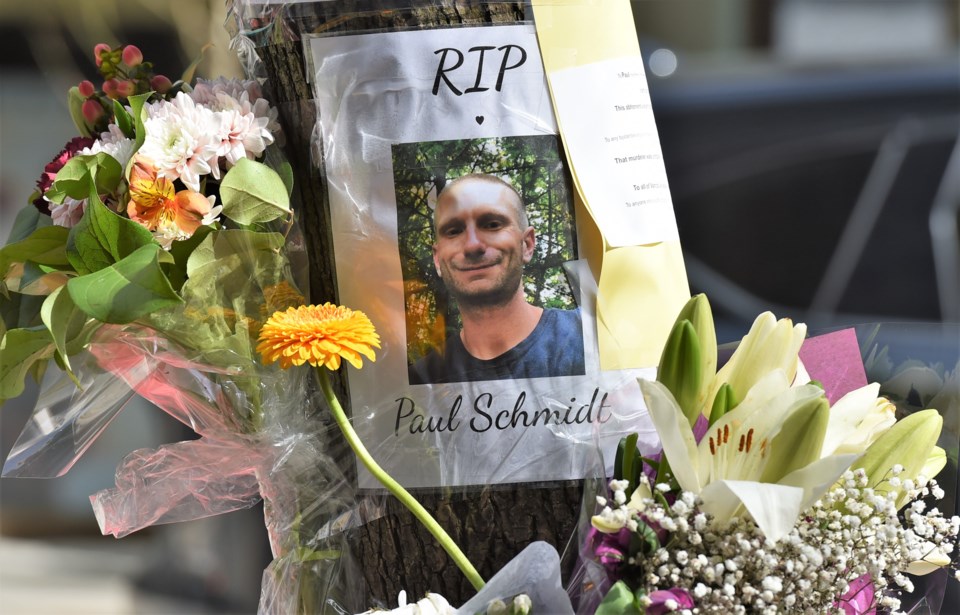Paul Schmidt was stabbed and killed outside a Vancouver Starbucks last weekend, after apparently asking the man accused in his murder not to vape near his toddler. The entire event was caught on video, which spread on social media, despite the family and police asking the public not to share the video.
This tragic killing brings up so many issues of modern society. The most important is that the life of a young father has been lost over a conflict that seems so trivial. It is so minor that this appears to be yet another example of random violence, by a stranger.
It makes me wonder about the long-term effects of the pandemic, people being increasingly isolated from one another, and more recently inflation driving up the cost of living. Are these factors causing people to lash out more often and more readily than in the past? I suppose only time will answer that question.
Calls by the family not to share the video are understandable. I saw the video — couldn’t look away, even though I knew it wasn’t going to be good for my mental health. If the victim was one of my loved ones, I certainly would not want the video circulating, online, where everything is permanent and can be revisited forever. Not only is the violence disturbing, but the very fact someone would make a video, rather than helping the victim, is a sign of our troubled times.
In the video, viewers can see a man who appears to be calmly drinking his coffee, just a few feet away from the altercation. Either he was in shock and didn’t know what to do, or he is a case study of a cold-hearted Vancouverite. I’m going to assume it was shock and fear, because the other is unthinkable.
Social media and smartphones have made it possible for anyone to create videos and disseminate them to the world. In the past, only journalists — who have training in ethics and law — had the means to broadcast to a wide audience, through their publishers or stations. This happened so fast there wasn’t time to debate or discuss how this massive change might affect young people, mental health, court cases, the suicide rate or pretty much our entire lives.
This discussion is necessary, especially now that social media companies are the most powerful and wealthy corporations in the world and foreign interference in democratic elections is a daily discussion.
We must talk about the power of social media, teach our kids about it and develop regulations and laws to control it. I’m a strong proponent of free speech, but I realize the dangers inherent in an interconnected world. Media literacy is now a survival skill.
Finally, let’s talk about vaping, the issue that apparently sparked the conflict. It’s one subject, among a growing number, about which I feel like a bit of a dinosaur. The other night I was out at a family dinner in a restaurant, and I discovered that a younger person at our table was surreptitiously vaping throughout the evening.
I only discovered it because I was looking right at him when he did it — otherwise there were no tell-tale signs. There was no smoke, no smell, nothing. I just saw his hand linger up by his mouth a little longer than it naturally would. When I called him on it, he told me people vape everywhere, all the time.
The long-term effects of vaping and the chemicals it involves are still being researched, since vaping hasn’t been around that long. When nicotine is vaped, it is addictive, Health Canada says. The effects of second-hand aerosol from vaping are unknown, Health Canada says, but nicotine has been detected in the blood and urine of non-users exposed to it.
Vaping is not allowed in public spaces in B.C., but given it’s not obvious when someone is vaping, it’s difficult to prevent it. Asking someone to stop vaping when in a child’s presence seems like a reasonable request to me, but I must admit it’s not something I’ve thought about before or seen any indication of an education campaign to stop it from happening.
All the facts are not yet in, and the story may change as the investigation continues. However, what this conflict reveals about the rest of us — increasing stranger violence, an unwillingness or fear to intervene, our lack of media literacy and a tendency to bury our heads in the sand on critical issues — are red flags we need to address for a positive future.
Tracy Sherlock is a freelance journalist who writes about education and social issues. Read her blog or email her [email protected].



